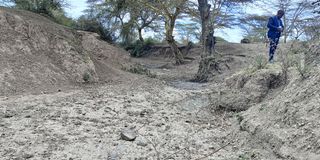Nyeri turns to ward committees in climate change fight

Dry water ways in Kieni, Nyeri County. More than 55, 000 people are in dire need of food in the constituency.
As the country continues to grapple with the throes of climate change, Nyeri has started implementing strategies spelled out in the County Climate Change Act, 2021 that seeks to help the administration cushion its people against the effects of changing weather patterns.
Having been listed among the 28 counties that are in need of relief food by the National Drought and Management Authority (NDMA), the county through the Act intends to create a fund that will help it facilitate community-initiated climate change adaptation mitigations activities.
Previously, the county has been food reliant but as the pangs of drought persist, hundreds remain in dire need of food and water as most rivers are at the brink of drying up.
In adaptation to climate change, the County's environment executive Fredrick Kinyua said the county is looking at any value of a climate fund that can help increase resilience and lower vulnerability and pains of things that come with climate change, especially the prolonged drought.
“As a county we need to evaluate the amount of carbon credit or carbon balance… how much carbon is tied within this county and how it can be done,” he said.
He added that Kenya can fight climate change through carbon capture which can be done by investing in agroforestry and practicing climate smart agriculture to reverse the effects of climate change.
“This is imperative because where the same carbon is giving us problems when in the air, it can be out in the soil and become soil organic carbon and that is something that is very much needed and that is something that is not in our soil,” he said.
Mr Kinyua spoke moments after overseeing the formation of committees that will work in liaison with other departments such as Agriculture, Health to help devise and apply methods that will help in the fight against climate change.
The Act provides for the formation of ward level committees that will be mandated to mobilize communities and other stakeholders in the ward to design and implement climate response activities as well as facilitate research and knowledge management at the ward level.
It will also facilitate public education, create awareness and capacity build at the ward level on climate change and its impacts and manage community consultations on priority response activities.
“These committees that will be within all the 30 wards will help identify the vulnerabilities and the capacity of the community as well as highlighting the technologies that can be highlighted at that level…this will aggregate to the constituency all the way for adoption at the national level,” he said.
Nyeri county seeks to tap funds such as the Green Climate Fund, Adaptation Fund to facilitate the engagement with locals at ward level as well as creating Adaptation benefit mechanism programmes that will plan and execute actions undertaken from the communities.
“The only way to fight against climate change is work with the communities and adapt to changes that will help us combat it,” added Mr Kinyua.
The County Climate Change Fund administrator will be appointed by the county executive member in charge of Finance.
The money shall be financed through money appropriated by the County assembly at least one per cent of the county audited revenue account in a financial year, grants and loans from the National Climate Fund, climate finance from national and international entities, fees and charges from climate change finance activities, grants and donations.
The finance minister in the county will formulae regulations that will guide eligibility criteria for accessing the money from the fund, operation of the fund and development of project proposals, application for and disbursement of the money.
Though Nyeri leads in forest cover at 40.8 per cent in Kenya, it is still being affected by drought and feeling the effects of climate change.
“We will get over this by adapting climate smart agriculture, water harvesting and planting trees that will sustain our livelihoods such as avocado trees, macadamia so that even when there is no food in the farms people can sustain their livelihoods through such trees,” said Mr Kinyua.





